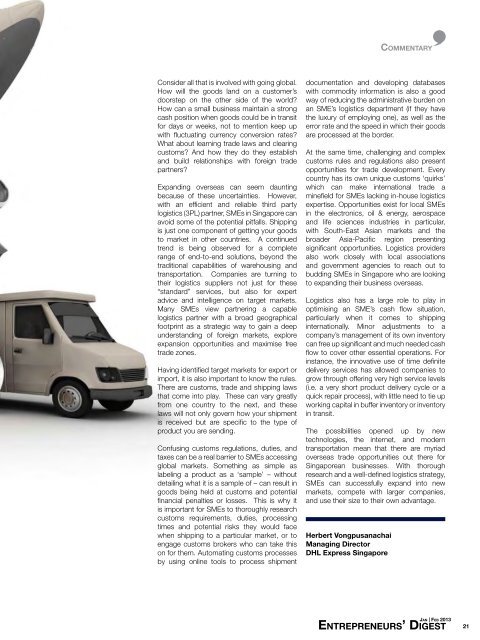ED 47: January-February 2013
Create successful ePaper yourself
Turn your PDF publications into a flip-book with our unique Google optimized e-Paper software.
Consider all that is involved with going global.<br />
How will the goods land on a customer’s<br />
doorstep on the other side of the world?<br />
How can a small business maintain a strong<br />
cash position when goods could be in transit<br />
for days or weeks, not to mention keep up<br />
with fluctuating currency conversion rates?<br />
What about learning trade laws and clearing<br />
customs? And how they do they establish<br />
and build relationships with foreign trade<br />
partners?<br />
Expanding overseas can seem daunting<br />
because of these uncertainties. However,<br />
with an efficient and reliable third party<br />
logistics (3PL) partner, SMEs in Singapore can<br />
avoid some of the potential pitfalls. Shipping<br />
is just one component of getting your goods<br />
to market in other countries. A continued<br />
trend is being observed for a complete<br />
range of end-to-end solutions, beyond the<br />
traditional capabilities of warehousing and<br />
transportation. Companies are turning to<br />
their logistics suppliers not just for these<br />
“standard” services, but also for expert<br />
advice and intelligence on target markets.<br />
Many SMEs view partnering a capable<br />
logistics partner with a broad geographical<br />
footprint as a strategic way to gain a deep<br />
understanding of foreign markets, explore<br />
expansion opportunities and maximise free<br />
trade zones.<br />
Having identified target markets for export or<br />
import, it is also important to know the rules.<br />
There are customs, trade and shipping laws<br />
that come into play. These can vary greatly<br />
from one country to the next, and these<br />
laws will not only govern how your shipment<br />
is received but are specific to the type of<br />
product you are sending.<br />
Confusing customs regulations, duties, and<br />
taxes can be a real barrier to SMEs accessing<br />
global markets. Something as simple as<br />
labeling a product as a ‘sample’ – without<br />
detailing what it is a sample of – can result in<br />
goods being held at customs and potential<br />
financial penalties or losses. This is why it<br />
is important for SMEs to thoroughly research<br />
customs requirements, duties, processing<br />
times and potential risks they would face<br />
when shipping to a particular market, or to<br />
engage customs brokers who can take this<br />
on for them. Automating customs processes<br />
by using online tools to process shipment<br />
Co m m E n ta r y<br />
documentation and developing databases<br />
with commodity information is also a good<br />
way of reducing the administrative burden on<br />
an SME’s logistics department (if they have<br />
the luxury of employing one), as well as the<br />
error rate and the speed in which their goods<br />
are processed at the border.<br />
At the same time, challenging and complex<br />
customs rules and regulations also present<br />
opportunities for trade development. Every<br />
country has its own unique customs ‘quirks’<br />
which can make international trade a<br />
minefield for SMEs lacking in-house logistics<br />
expertise. Opportunities exist for local SMEs<br />
in the electronics, oil & energy, aerospace<br />
and life sciences industries in particular,<br />
with South-East Asian markets and the<br />
broader Asia-Pacific region presenting<br />
significant opportunities. Logistics providers<br />
also work closely with local associations<br />
and government agencies to reach out to<br />
budding SMEs in Singapore who are looking<br />
to expanding their business overseas.<br />
Logistics also has a large role to play in<br />
optimising an SME’s cash flow situation,<br />
particularly when it comes to shipping<br />
internationally. Minor adjustments to a<br />
company’s management of its own inventory<br />
can free up significant and much needed cash<br />
flow to cover other essential operations. For<br />
instance, the innovative use of time definite<br />
delivery services has allowed companies to<br />
grow through offering very high service levels<br />
(i.e. a very short product delivery cycle or a<br />
quick repair process), with little need to tie up<br />
working capital in buffer inventory or inventory<br />
in transit.<br />
The possibilities opened up by new<br />
technologies, the internet, and modern<br />
transportation mean that there are myriad<br />
overseas trade opportunities out there for<br />
Singaporean businesses. With thorough<br />
research and a well-defined logistics strategy,<br />
SMEs can successfully expand into new<br />
markets, compete with larger companies,<br />
and use their size to their own advantage.<br />
herbert vongpusanachai<br />
Managing Director<br />
Dhl express Singapore<br />
Ja n | FE b <strong>2013</strong><br />
En t r E p r E n E u r s’ Di g E s t<br />
21












